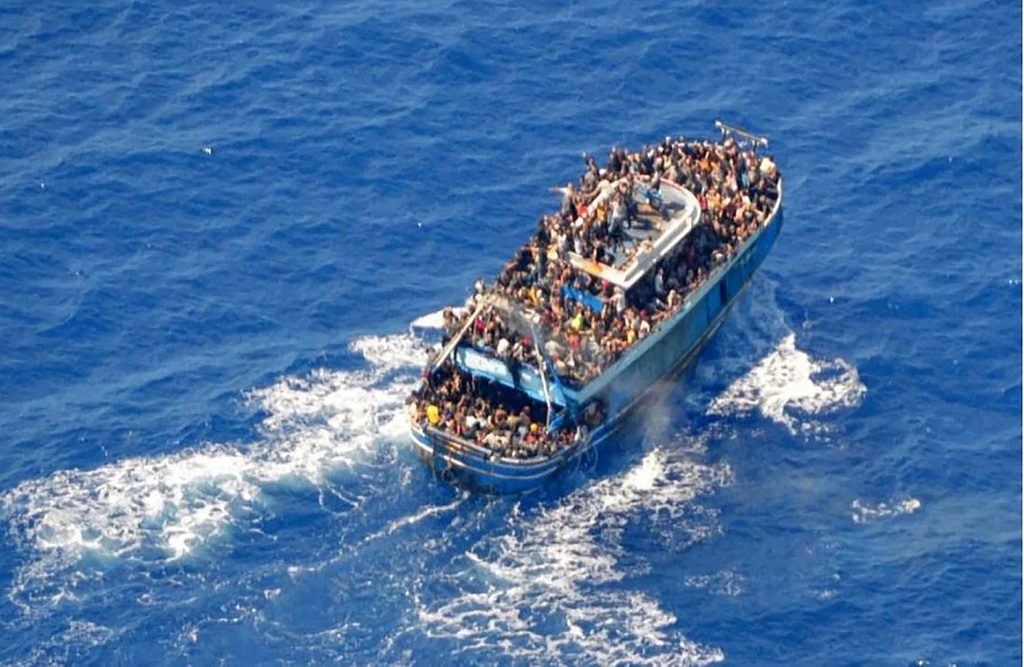The Greek authorities have decided to launch an investigation headed by a public prosecutor of the shipwreck which took place early Wednesday morning last week in deep waters off the southern coast town of Pylos. The shipwreck is the deadliest shipwreck in the Mediterranean Sea in years.
The exact death toll is not known but the number is estimated to have been several hundred. The boat, an unseaworthy fishing vessel which took off from Tobruk in Libya, was packed with reportedly up to 750 undocumented migrants, men, women and children. About 100 survivors were brought ashore and about 80 people were found dead.
Any more bodies have not been found after the first 24 hours of the Greek search and rescue operation. The chances of retrieving the sunken vessel are also remote because of the depth of the water, according to the Greek authorities.
The smugglers who operated the ship are nine Egyptians who departed from Egypt and took on board the migrants in Tobruk before setting sail for Italy. The smugglers might have thought that it would be easier to disembark the migrants in Italy because of the Greek pushback policy. All nine of them have been arrested and were brought on Monday to the District Prosecutor Office in Kalamata.
From the very start, when the tragic news about the shipwreck became known, the European Commission has been asked about its search and rescue policy and whether it would call for an independent and credible investigation of the accident as it did in May when media reported about an alleged pushback of a group of asylum seekers from Lesbos into the open sea by the Greek Coast Guard.
The immediate answer by its spokespersons on Wednesday was that it was too early for that as the search and rescue operation was still ongoing. What was known by the Commission at that early stage was that the vessel was first spotted by a plane belonging to Frontex, the European Border and Coast Guard Agency.
Frontex duly alerted the neighboring national coast guards about the vessel which apparently was in distress. Was then happened is not yet clear and needs to be investigated.
As previously reported by Solomon, an independent newsletter, the coast guard ignored calls or emails for help which had been sent by passengers to an emergency call centre (Alarm Phone) and which had been forwarded to the authorities.
The Greek Coast Guard, on its part, claimed that it arrived to the scene to offer assistance but received a negative response. The passengers or the crew refused any assistance and stated that they wished to continue their voyage to Italy. Even if this would be true, legal experts and former officers of the coast guard have questioned the coast cards’ reaction as illogical and illegal according to maritime law.
They point out that the vessel was manifestly unseaworthy and the people on board were in danger. A refusal to accept assistance was therefore not a reason to leave it to its fate.
A Greek minister has claimed that an “intervention by the coastguard could have placed an overloaded vessel in danger, which could capsize as a result". Surviving migrants have claimed that the vessel capsized because of an unsuccessful attempt by the coast guard to tow it ashore.
At the Commission’s press conference on Monday, the spokespersons could not give any details about the Greek investigation or if the Commission would reconsider its policy of relying on the member states and act more proactively. They referred to the meeting on Friday (16 June) of the European Contact Group on Search and Rescue (SAR).
According to its agenda, the Contact Group discussed “existing laws and policies on private vessels carrying out SAR as their predominant activity”, “next steps on enhancing operational cooperation on Search and Rescue in the Mediterranean Sea,” and “the EU’s support to third countries on SAR. What exactly was agreed is not known since the minutes of the meeting have not yet been published.
This was only the fourth meeting of the SAR Contact Group since it was established in December 2020. It is essentially a body for coordination and information exchange between the EU member states in the field of search and rescue.
The Commission spokesperson explained that the objective of the Contact Group is to gather knowledge on rules and practices developed and applied by member states, in order to enhance common understanding of SAR and to contribute to develop common practices in this field, in compliance with the applicable international and European legal framework.
In the meantime, the Commission is not able to comment on the Greek investigation. What seems clear is that Frontex will not carry out any investigation but that it could provide input to it. “Serious Incident Reports are shared with relevant national authorities and may serve as supporting documents during investigations conducted by national authorities,” according to a press officer at Frontex.
Nor will the Greek National Transparency Authority, which was tasked to investigate the alleged pushback last month, participate in the new investigation headed by the public prosecutor, according to a source in the Greek embassy in Brussels. This Authority deals mainly with anti-corruption measures but has received further responsibilities.
M. Apelblat
The Brussels Times

